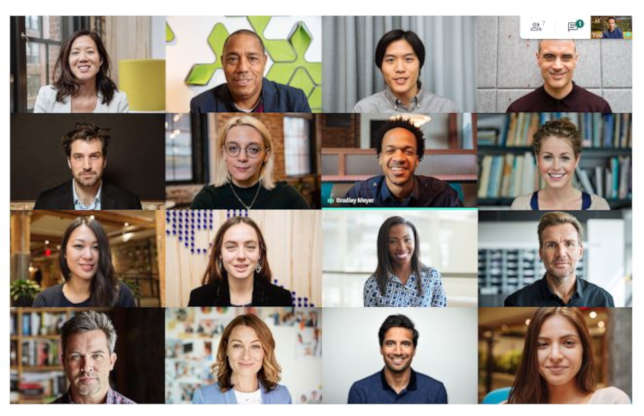Google Meet Now Offers Free Option
- By Dian Schaffhauser
- 05/13/20

Google has just made premium functionality
in its online video meeting software freely available to anybody with
a Google e-mail account. As
of this week,
Google
Meet
enables users to host video meetings with up to 100 people for up to
24 hours. (Competitor Zoom
cuts off freebie meetings at 40 minutes.) That unlimited amount of
time will last until Sept. 30, 2020; then it will be shortened to 60
minutes in the free product.
Meet
has been available to paying customers. Early on during virus
closures, the company made advanced features free for use by
organizations (such as schools) with G
Suite.
And last month Google announced that Meet would also be made
available free for consumer user.
Among
the features:
-
Basic
scheduling and screensharing;
-
A
tile layout that enables viewers to see up to 16 people at a time;
-
The
ability for presenters using Google Chrome to share a single browser
tab rather than showing their entire screen, which, the company
noted, would enhance video and audio quality;
-
A
lighting mode that brightens people's faces, even in a dark room or
when they're sitting against a lighted background; and
-
Fairly
accurate real-time captioning.
Recording
is still a feature only available to users running Meet through G
Suite.
On
the security front, since Meet is built onto Google's existing
account system, it has added layers of protection built in. That also
adds to its complexity. You may find that recipients of invitations
have to sign into a Google account to be able to access the meeting.
Security features include host controls that allow the host to admit
or deny entry to a meeting and mute and remove participants. Also,
the company said that its video meetings are encrypted in transit and
recordings stored in Google Drive are encrypted both in transit and
in rest.
One
new feature the company is experimenting with is background noise
cancellation, the current enemy of productive video meetings
everywhere. Google's servers handle the ambient noise suppression, to
make voices clearer. That feature will be rolled out first to paying
customers, then to web users, and finally to mobile users.
Meet
is available for free on the web at meet.google.com
and via mobile app for iOS
and Android.
About the Author
Dian Schaffhauser is a former senior contributing editor for 1105 Media's education publications THE Journal, Campus Technology and Spaces4Learning.